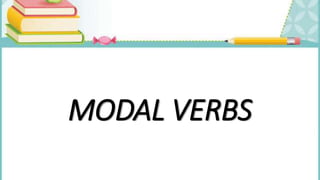
Essential Guide to Modal Verbs
- 1. MODAL VERBS
- 2. What are modal verbs? They are auxiliary verbs that Provide additional and specific meaning to the Main verb of the sentence.
- 3. Modal verbs are: CAN COULD SHALL SHOULD WILL WOULD MAY MIGHT MUST
- 4. How do we use modals? Example: Mary could play the piano S Subject V Verb M Modal verb They do not accept conjugation They do not need other auxiliary verbs
- 5. Form He can swim He cans swim (or) he can swims Would you like to come with me? Do you like to come with me? They can’t be serious They don’t can be serious There is no ”s” in singular There is no “do / does “ in the question There is no “do / doesn’t” in the negative
- 6. to can / caning to must / musting She must study (strong obligation) We should have gone to the other way (recommendation) He could play football in his youth (ability in the part) Model verbs do not have infinitives or – ing form Model verbs are followed by an infinitive without to
- 7. Examples: • They can play piano They will be able to play piano in the future • You must come early You have to come early Model verbs do not have all these tenses Model verbs use another verbs to complete the tenses Can is completed with be able to Must is completed with have to
- 8. What do they express? • Single concept modal: they have one meaning • Double concept modal: they have two meanings • Modals in past: they are used to express a situation in the past They can have more than one meaning depending on the situation
- 9. Single concept modals Double concept modals Modals in past Will Might Should Ought to Had better May Must Would Shall Could Can Would have Could have Might have Should have May have Must have
- 10. Single Concept Modal Modal Concept Examples Will Future Joe will travel to US next week Might Small probability I might move to Canada some day Should Recommendation You should go to the doctor Ought to Formal recommendation We ought to know about first aid Had better Warning I had better study or I will fail the test
- 11. Double concept model Modal Concept Examples May (1) Permission May I come in? May (2) Good probability We may visit Mexico in this summer Must (1) Responsibility Everyone must pay taxes Must (2) Assumption She didn’t arrive. She must be back
- 12. Modals Concept Examples Would (1) Past (used to) When I was young, I would play soccer Would (2) Present unreal I would buy the car but I can’t afford it Shall (1) Educated expression offer Excuse me, I shall go now Shall I clean it Shall (2) Contractual obligation The company shall pay on January 1st
- 13. Modal Concept Examples Could (1) Unreal Ability I could go if I had time Could (2) Past Ability She could play the piano (but she can’t anymore) Can (1) Present Ability We can speak English Can (2) Permission Can I have a candy?
- 14. MODALS PROBABILITY/ POSSIBILITY ABILITY PERMISSION OBLIGATION/ ADVICE OFFERS CAN I can play the piano Can I go out tonight? CAN’T She can’t be his mum. She’s is too young I can’t speak German Can I borrow the car? No, I can’t. MIGHT It might rain tomorrow COULD It could rain tomorrow I could already read when I was two Cold I see your passport please, sir?
- 15. MODALS PROBABILITY/ POSSIBILITY ABILITY PERMISSION OBLIGATION/ ADVICE OFFRES MAY It may rain tomorrow May I leave the table? MUST She must be his sister because they look alike. You must leave before the clock strikes twelve. HAVE TO I have to study tonight. SHALL You shall pay on Tuesday. Shall I help you?
- 16. MODALS PROBABILITY/ POSSIBILITY ABILITY PERMISSION OBLIGATION/ ADVICE OFFERS SHOULD / OUGHT TO You should see it. It’s excellent. HAD BETTER You had better sleep more. WOULD Would you like a drink?
- 17. Modals In the past • They are modals referred to actions that happened in the past Examples: It must have been a difficult decision They should have invited her to their wedding MODAL + HAVE + Verb in past participle
- 18. MODAL PERFECT USES EXAMPLES MUST HAVE + PAST PARTICIPLE Logical conclusion on a past event Peter has arrived late. He must have been in a traffic jam MAY / MIGHT HAVE + PAST PARTICIPLE Deduction on a past event Joe may / might have taken the wrong train. COULD HAVE + PAST PARTICIPLE Possibility to do something, gone unfulfilled You could have played better COULDN’T HAVE + PAST PARTICIPLE Certainty that something couldn’t have happened He couldn’t have passed because you hadn’t studied enough
- 19. MODAL PERFECT USES EXAMPLES WOULD HAVE + PAST PARTICIPLE Desire to do something, but impossibility to do it for external causes I would have visited you, but I forget your address SHOULD / OUGHT TO HAVE + PAST PARTICIPLE Lament on something that should have been done You should / ought to have warned me earlier SHOULDN’T HAVE + PAST PARTICIPLE Critique on something that shouldn’t have happened He shouldn’t have told them NEEDN’T HAVE + PAST PARTICIPLE Something that wasn’t necessary doing You needn’t have bought it.
- 20. Modals- like verbs A few verbs which often serve as modals too. They need to be conjugated. Model Concept Example Like to Enjoy I like to watch TV Want to Desire John wants to buy a car Need to Necessity We really needed to talk to you
- 21. Modal Concept Example Have to Obligation Susan had to pay the rent Have got to Have to I have got to go now Look forward to Future plan I look forward to seeing you again